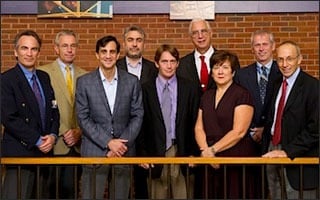Coulter Foundation award to fund projects with translational potential

The Johns Hopkins Department of Biomedical Engineering has received a Coulter Foundation Translational Partnership Award that will result in $5 million in funding over the next five years to speed the movement of new medical devices out of the university’s labs and into hospitals and doctor’s offices.
The money will support collaborations between Johns Hopkins physicians and biomedical engineering faculty in designing and developing innovative medical devices and diagnostics that can significantly improve the testing and treatment of medical patients and reduce health care costs. The program’s goal is to identify and fund projects annually and guide them from the lab through early commercial development. Student researchers can participate in developing these projects.
“Johns Hopkins already has a reputation for delivering first-rate clinical care to patients,” said Elliot McVeigh, director of the Department of Biomedical Engineering. “This grant will allow us to similarly showcase our skills in developing and sharing wonderful new devices that can help enhance the medical care that patients receive.”
To support this goal, the Miami-based Wallace H. Coulter Foundation has agreed to provide $667,000 annually over each of the next five years. The schools of Engineering and Medicine also will contribute a combined $333,000 annually, resulting in a total of $1 million available each year to support new biomedical projects.
Nicholas P. Jones, the Benjamin T. Rome Dean of the Whiting School of Engineering, said, “We are thrilled that the Coulter Foundation has recognized the potential within Johns Hopkins to effectively commercialize innovation in the critical area of biomedical research.”
Preliminary proposals for the first set of projects are due Jan. 15. Each project must be led jointly by one faculty member from the Department of Biomedical Engineering and one from the School of Medicine.
The process of building on basic science discoveries to produce practical applications in medicine and other fields is often called translational research. Because most academic research is not focused on translation and commercialization, smaller seed grants will be available to enable faculty members to develop more detailed plans and prepare full proposals to the Coulter Program Oversight Committee.
In May, this committee, made up of 10 members from Johns Hopkins, the Coulter Foundation and experienced commercial medical technology professionals, will award five $100,000 grants and up to four $25,000 seed grants. The key criteria for selection are high potential to benefit patients and high potential for commercial success. Program administrators said that the second provision is important because to be commercially successful today, innovation must not only improve outcomes but also reduce cost.
Similar university programs funded earlier by Coulter have resulted in inventions that have led to dozens of commercial licensing agreements and startup companies, Johns Hopkins program administrators said, and to a sevenfold return on the grants in the form of new research and investment to the host institutions.
Johns Hopkins’ Biomedical Engineering Department, which is shared between the School of Medicine and the Whiting School of Engineering, is widely acknowledged to be one of the world’s top programs in its field. In recent years, it has directed additional attention to encouraging students and faculty members to apply their skills to developing new diagnostic tools and treatments that can quickly address urgent medical problems identified in partnership with Johns Hopkins physicians.
The department’s Center for Bioengineering Innovation and Design, for example, requires master’s degree students to work closely with physicians to identify tools needed to improve the care they provide to patients. The students then design and build prototypes of such devices and prepare business plans for their invention. Some have launched startup companies or licensed their technologies to existing firms.
Youseph Yazdi, an assistant professor of biomedical engineering, is executive director of CBID and has also been named director of the Coulter Translational Research Program at Johns Hopkins.
“The combination of CBID and the new Coulter Partnership, plus other strong translational work ongoing here, will give Johns Hopkins’ BME Department the critical mass needed to be a global leader in academic-based medtech innovation,” Yazdi said. “Students, clinicians and faculty all benefit from the experience of creating and developing something that goes into commercial use, but the true beneficiaries are the patients who receive better care that also reduces costs.”
